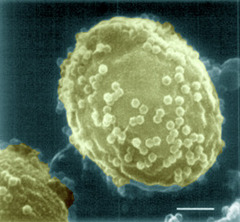Chlorella sp NC64A
Overview

The microalgae, Chlorella NC64A is of special interest because it is the host for a family of large (>310 kb), plaque-forming, dsDNA viruses (called chlorella viruses) that are found in freshwater throughout the world. The NC64A-virus system is a model system for studying DNA virus/algal interactions. This model system is relevant to DOE for two reasons: a) Fifty to sixty percent of the CO2 fixed on the planet is by phytoplankton that includes cyanobacteria, as well as eukaryotic microalgae. At any one time as many as 20% of these photosynthetic organisms are infected with a virus.Thus viruses play a significant role in global carbon/nitrogen cycles that has been relatively unaccounted for by scientists who model carbon/nitrogen cycles. b) Most known viruses infecting microalgae are large dsDNA viruses evolutionarily related to the chlorella viruses. The sequence of the NC64A genome will, for the first time, allow studies in which genes from both a dsDNA virus exceeding 300 kb and its host are available for analysis.
- Source
- JGI 1.0
- PLAZA identifier
- cnc64a
- NCBI link
- Chlorella sp NC64A
- Mitochondrion
- Not available
- Chloroplast
- Not available
Toolbox
Various
- PLAZA download section
- Explore functional clusters
- Documentation data content
- View organism in the Genomeview or in the AnnoJ genome browser.
- View Chlorella sp NC64A specific or enriched gene families

Loading...please wait

Loading...please wait

Loading...please wait












